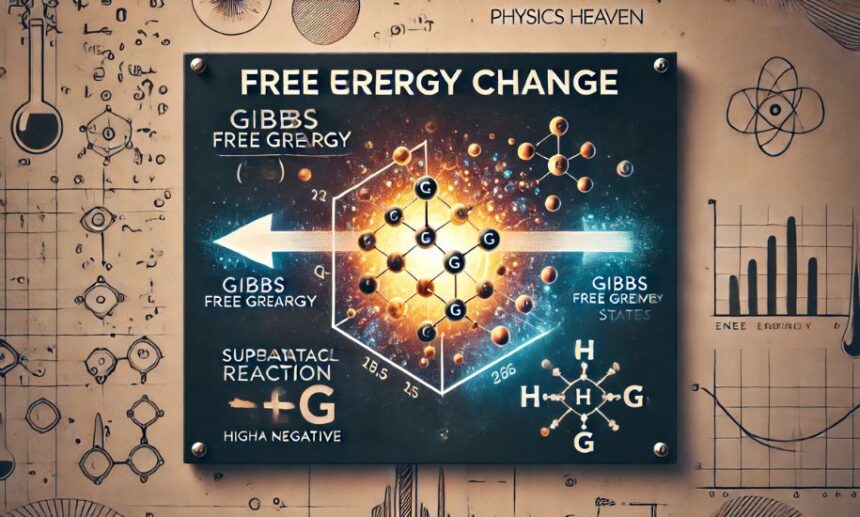Physics Heaven welcomes you to an in-depth discussion on one of the most fundamental concepts in thermodynamics: why is higher change in free energy favored in thermodynamic systems? Free energy plays a crucial role in determining whether a process or reaction will occur spontaneously. The concept is widely used in physics, chemistry, and engineering, shaping our understanding of energy transformations.
In this article, we will explore why a greater change in free energy is preferred in thermodynamics, the significance of Gibbs free energy, and how it influences natural and industrial processes.
What is Free Energy in Thermodynamics?
Before diving into why is higher change in free energy favored in thermodynamic systems, we need to understand the concept of free energy itself.
In thermodynamics, free energy refers to the amount of energy available to do work in a system at a constant temperature and pressure. It determines whether a reaction is spontaneous or requires external energy input. There are two main types of free energy:
- Gibbs Free Energy (G): Used in chemical reactions, defined as: ΔG=ΔH−TΔS\Delta G = \Delta H – T \Delta S where ΔG is the change in free energy, ΔH is enthalpy change, T is temperature, and ΔS is entropy change.
- Helmholtz Free Energy (A): Used for systems at constant volume.
For a reaction to be spontaneous, ΔG must be negative. This leads us to the question: why is higher change in free energy favored in thermodynamic processes?
Why is Higher Change in Free Energy Favored in Thermodynamic Systems?
A greater change in free energy means that a process is more likely to be spontaneous and efficient. The reasons behind this include:
1. Higher Free Energy Change Increases Spontaneity
A larger negative ΔG indicates a strong tendency for a reaction to occur without external energy input. In thermodynamics, the universe favors processes that lead to lower energy states. When ΔG is highly negative, it means the system has moved toward a more stable state, releasing energy that can be utilized elsewhere.
For example, combustion reactions have very high negative ΔG, making them highly favorable and spontaneous. This explains why fuels burn efficiently, releasing energy for practical use.
2. Energy Efficiency in Natural and Industrial Processes
Many biological and industrial processes rely on reactions with a high change in free energy to function efficiently. In living organisms, ATP hydrolysis is a prime example:
ATP+H2O→ADP+Pi+EnergyATP + H_2O → ADP + P_i + Energy
This reaction has a high negative ΔG (~ -30.5 kJ/mol), making it a key energy source for cellular activities. Similarly, in industries, high-energy transformations (like in fuel cells and turbines) operate best when the free energy change is maximized.
Thus, why is higher change in free energy favored in thermodynamic becomes clear—larger changes drive more efficient processes.
3. Entropy and the Second Law of Thermodynamics
One of the core principles of thermodynamics is the second law, which states that entropy (disorder) always increases in a spontaneous process. The equation:
ΔG=ΔH−TΔS\Delta G = \Delta H – T \Delta S
shows that a higher ΔG change is favored when ΔS is large. This means systems naturally tend toward states of greater disorder, ensuring higher energy availability.
For instance, the melting of ice at room temperature is favored because of its high entropy increase, resulting in a high negative ΔG.
4. Driving Reactions to Completion
A higher change in free energy also means that reactions proceed more completely toward products. If ΔG is only slightly negative, a reaction may only partially proceed, leading to equilibrium rather than full transformation.
For example, in electrochemical cells, such as batteries, the higher the change in free energy, the more effective the energy conversion. A larger ΔG ensures that more electrons flow, generating useful electrical energy.
This directly supports why is higher change in free energy favored in thermodynamic systems—greater changes allow reactions to reach completion, maximizing energy extraction.
5. Impact on Chemical Equilibrium
Reactions with a high negative ΔG tend to lie far toward the product side at equilibrium. This is crucial in chemical engineering, where maximizing yield is essential.
For example, in Haber’s process for ammonia synthesis:
N2+3H2⇌2NH3N_2 + 3H_2 \rightleftharpoons 2NH_3
A higher negative ΔG means that more ammonia forms, making the process more economically viable. Thus, a larger free energy change is beneficial for industrial efficiency.
6. Temperature Influence on Free Energy Change
Temperature plays a critical role in why is higher change in free energy favored in thermodynamic systems. The equation:
ΔG=ΔH−TΔS\Delta G = \Delta H – T \Delta S
shows that as temperature increases, the effect of entropy (TΔS) becomes more significant. This means reactions with high entropy changes become even more favorable at higher temperatures.
For example, the vaporization of water becomes increasingly spontaneous at higher temperatures due to the increasing influence of ΔS. This explains why boiling is easier at higher temperatures.
Conclusion: Why is Higher Change in Free Energy Favored in Thermodynamic Systems?
To summarize, why is higher change in free energy favored in thermodynamic is based on the following principles:
- Greater spontaneity: Larger negative ΔG makes processes more likely to occur.
- Higher efficiency: Industrial and biological systems rely on high free energy changes for maximum performance.
- Entropy’s role: Higher energy change aligns with the second law of thermodynamics.
- Reaction completeness: Stronger energy changes push reactions to full completion.
- Chemical equilibrium: More negative ΔG ensures favorable product formation.
- Temperature dependence: High entropy changes make free energy changes more significant at elevated temperatures.
Understanding why is higher change in free energy favored in thermodynamic systems helps us grasp how nature and technology harness energy efficiently. Whether in biological functions, industrial applications, or everyday chemistry, the principles of free energy govern countless processes around us.
At Physics Heaven, we continuously explore the beauty of physics and thermodynamics. Stay curious and keep exploring the fascinating world of energy transformations!








